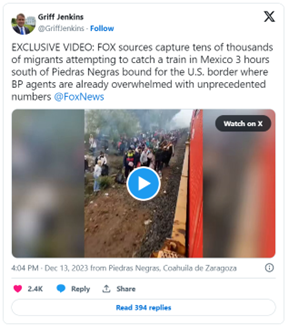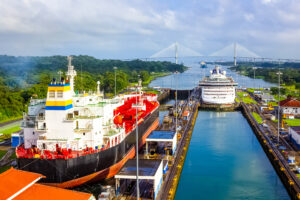
U.S. Customs and Border Protection (CBP) has temporarily suspended all rail operations in Eagle Pass and El Paso, Texas after observing a surge in the smuggling of migrants across the Southern Border by train, throwing yet another kink into supply chains.
CBP said in a statement on Sunday that the two rail bridges – the second and third highest volume gateways moving freight between the U.S., Canada, and Mexico – will close as of 8 a.m. on December 18 in order to redeploy resources to assist Border Patrol agents with taking migrants into custody in what it described as an “evolving situation.”
CBP said it was closing the bridges because smuggling organizations were using the freight trains with increasing frequency to transport their human cargo.
The announcement follows the apprehension of nearly 4,500 illegal migrants in Del Rio and El Paso by border patrol agents on Sunday and comes on the heels of a slew of viral videos on social media depicting a flood of migrants riding freight trains bound for the U.S.
The suspension of international railway traffic is one of several changes CBP has made in efforts to “respond, process, and enforce consequences” of unauthorized crossings along the border with Mexico, the agency said. In recent weeks, CBP has closed the port of entry in Lukeville, AZ, a pedestrian crossing in San Diego, CA, and a vehicle crossing in Eagle Pass, TX. “We [will] continue to adjust our operational plans to maximize enforcement efforts against those noncitizens who do not use lawful pathways or processes such as CBP One™ and those without a legal basis to remain in the United States,” it added.
Cross-border Freight Begins Piling Up
Union Pacific, which manages the route, said the closure has prompted an embargo on all of its Mexican-bound cargo, including 60 trains already enroute as well as those that are currently being processed in more than 50 rail yards across the country. That traffic alone amounts to over 4,500 rail cars being held north of the border, with “an equivalent amount of northbound traffic currently held south of the border.”
The closure of railway and border crossings will not only hinder trade, but also “make a bad situation worse, inflicting even more economic harm on the U.S.-Mexico relationship and driving up costs,” Border Trade Alliance President Britton Mullen said in a statement. “These port closures are a byproduct of Congress and the administration’s failure to adopt a border security and immigration reform package that can balance our economic and physical security,” Britton added. “The public and private stakeholders whose livelihoods depend on a well-managed, well-resourced, and secure border have waited long enough.”
Border States Called to Action
Meanwhile, Texas and Arizona have been forced to take a number of actions to combat the ongoing border crisis, which has seen a sharp rise in recent weeks. In November, border patrol agents apprehended 192,000 migrants, up from 188,000 in October. Governors from both states have deployed National Guard troops to assist Border Patrol agents in patrolling the border. Texas also passed three new bills yesterday to deter the illegal immigration, including allocating state money to continue construction of the 1,200-mile border wall, increasing the minimum sentence for smuggling immigrants from two to ten years, and making it a criminal offense to enter the state illegally.
Republican Tony Gonzales of San Antonio warned it is “time to sound the alarm… Our entire southern border is being dismantled by the cartels.” In Arizona, Senators Kyrsten Sinema and Mark Kelly said in a joint statement, “For far too long, Arizona communities have paid the price for Washington’s failures on the border… Our Ports of Entry are key drivers of economic growth and security in our state,” calling the migrant crisis “an unacceptable outcome that further destabilizes our border, risks the safety of our communities, and damages our economy.”
 The Grinch is up to his nasty tricks again, getting ready to steal Christmas from the Whos down in Whoville who have enjoyed tariff-free imports from China.
The Grinch is up to his nasty tricks again, getting ready to steal Christmas from the Whos down in Whoville who have enjoyed tariff-free imports from China.


